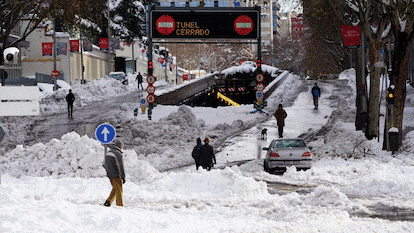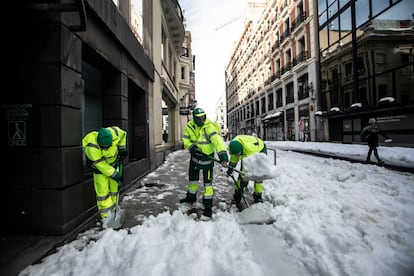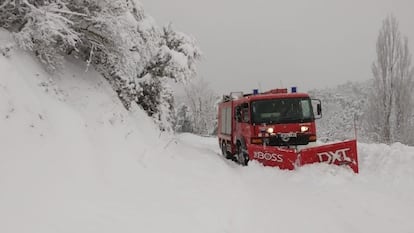Madrid closes schools until January 18 in wake of Storm Filomena
The news comes as Spain enters an intense cold snap, with temperatures forecast to plunge below -15ºC in several provinces

The premier of Madrid, Isabel Díaz Ayuso, announced on Monday that in-person classes will be suspended across the region until Monday January 18, due to Storm Filomena, which caused the biggest snowfall the Spanish capital has seen in more than 50 years over the weekend.
“It is necessary to fix damage [to schools] and guarantee a safe return to the classroom after the snow and the cold,” the conservative Popular Party (PP) politician said in a message on Twitter.
All classes will be suspended on Tuesday, with remote learning resuming from Wednesday.
Speaking in a radio interview with Onda Madrid on Monday morning, the mayor of Madrid, José Luis Martínez-Almeida had warned that schools may be closed beyond Tuesday to assess whether the “unprecedented” snowfall had damaged centers.

The mayor has also called on the central government – a coalition of the Socialist Party (PSOE) and junior partner Unidas Podemos – to declare the city of Madrid a disaster area, a request backed by Ayuso. “Declaring Madrid a disaster area should not be a problem for a wasteful government, because on other issues they spend a crazy amount,” she told Antena 3.
Transportation Minister José Luis Ábalos said on Monday in a television interview with national broadcaster RTVE that “the damage has to be assessed” before any declaration can be made.
Storm Filomena paralyzed the city of Madrid over the weekend, forcing the closure of Adolfo Suárez-Barajas Airport, suspending train services and leaving as many as 1,500 people trapped in their cars. As of Monday, the Metro continued to be the only public transportation system that was fully operational. The local Cercanías commuter trains resumed service on Monday on three lines, while some long-distance trains, including the high-speed AVE, began to resume activity on Sunday.
Madrid’s Barajas airport also reopened Sunday night, with the first flight arrivals scheduled for Monday. Nearly 700 roads also remain affected by the snow.
Cada vez más vecinos bajan con palas para limpiar las calles. Viva Chamberí pic.twitter.com/YuOCsY2jRx
— cecilia ballesteros (@ceciliab) January 10, 2021
“More neighbors coming out with shovels to clear the streets.”
Residents of Madrid were seen on Sunday helping to clear snow from roads and building entrances before it turned into ice. Maximum temperatures are forecast to be between 5 and 10ºC below average on Monday and Tuesday, while the minimum could be up to 15ºC below average. During the day, temperatures are not expected to exceed 5ºC and could remain as low as 0ºC. At night, the thermometers may fall below -10ºC, which “has only occurred on one occasion in the last 100 years,” according to Rubén del Campo, the spokesperson for Spain’s AEMET state weather agency. This would break the previous record of -10.11ºC, which was set on January 16, 1945, at the weather station at Retiro Park.
Cold snap in Spain
Spain is forecast to enter a four-day cold snap on Monday, with temperatures set to plummet as a result of Storm Filomena. Thirty provinces in 11 regions – Andalusia, Aragón, Cantabria, Castilla y León, Castilla-La Mancha, Catalonia, Extremadura, Madrid, Murcia, La Rioja and Valencia – are on alert for cold weather. In the cities of Valladolid, Cuenca, Toledo, Albacete, Palencia and Soria, the thermometer is expected to drop to between -8ºC and -10ºC.

The frosty temperatures were already being felt early Monday morning in Soria, where the village of Burgo de Osma recorded a low of -17.5ºC. The thermometer also fell below -13ºC in Zaragoza, Segovia, Lleida and Guadalajara.
Between Monday and Friday, Spain is forecast to experience a “Scandinavian winter, where the norm in January is for it to be 0ºC during the day, which falls to -10ºC to -15ºC at night,” said José Miguel Viñas, a meteorologist for the weather website tiempo.com. The expert warned that the overnight frosts and low daytime temperatures will turn the heavy snowfall into ice, which will “complicate mobility.”
According to Viñas, the low temperatures will start to rise on Wednesday before normalizing over the weekend. “Although it will continue being more cold than normal, it won’t be as extreme,” he said.
Schools in Aragón and Castilla-La Mancha were closed on Monday and Tuesday. Around 20 schools in Catalonia also suspended classes due to the extreme weather.
English version by Melissa Kitson.
Tu suscripción se está usando en otro dispositivo
¿Quieres añadir otro usuario a tu suscripción?
Si continúas leyendo en este dispositivo, no se podrá leer en el otro.
FlechaTu suscripción se está usando en otro dispositivo y solo puedes acceder a EL PAÍS desde un dispositivo a la vez.
Si quieres compartir tu cuenta, cambia tu suscripción a la modalidad Premium, así podrás añadir otro usuario. Cada uno accederá con su propia cuenta de email, lo que os permitirá personalizar vuestra experiencia en EL PAÍS.
¿Tienes una suscripción de empresa? Accede aquí para contratar más cuentas.
En el caso de no saber quién está usando tu cuenta, te recomendamos cambiar tu contraseña aquí.
Si decides continuar compartiendo tu cuenta, este mensaje se mostrará en tu dispositivo y en el de la otra persona que está usando tu cuenta de forma indefinida, afectando a tu experiencia de lectura. Puedes consultar aquí los términos y condiciones de la suscripción digital.








































